20 start with B start with B
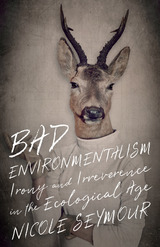
Traces a tradition of ironic and irreverent environmentalism, asking us to rethink the movement’s reputation for gloom and doom
Activists today strive to educate the public about climate change, but sociologists have found that the more we know about alarming issues, the less likely we are to act. Meanwhile, environmentalists have acquired a reputation as gloom-and-doom killjoys. Bad Environmentalism identifies contemporary texts that respond to these absurdities and ironies through absurdity and irony—as well as camp, frivolity, irreverence, perversity, and playfulness.
Nicole Seymour develops the concept of “bad environmentalism”: cultural thought that employs dissident affects and sensibilities to reflect critically on our current moment and on mainstream environmental activism. From the television show Wildboyz to the short film series Green Porno, Seymour shows that this tradition of thought is widespread—spanning animation, documentary, fiction film, performance art, poetry, prose fiction, social media, and stand-up comedy since at least 1975. Seymour argues that these texts reject self-righteousness and sentimentality, undercutting public negativity toward activism and questioning basic environmentalist assumptions: that love and reverence are required for ethical relationships with the nonhuman and that knowledge is key to addressing problems like climate change.
Funny and original, Bad Environmentalism champions the practice of alternative green politics. From drag performance to Indigenous comedy, Seymour expands our understanding of how environmental art and activism can be pleasurable, even in a time of undeniable crisis.
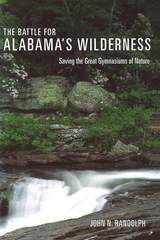
Traces the development of Alabama's environmental movement from its beginnings with the establishment of The Alabama Conservancy in the late 1960s and early '70s to the preservation efforts of present-day activist groups
The grassroots effort to preserve Alabama's Wilderness Areas spanned thirty years, from 1967 to 1997. The first battle, to establish the Sipsey Wilderness in the Bankhead National Forest, was the catalyst for reform of national policy regarding public land preserves in the eastern United States. It, and the later campaigns—to establish the Cheaha Wilderness, to enlarge the Sipsey, and to create the Dugger Mountain Wilderness—are classic tales of citizen activists overcoming the quagmire of federal bureaucracy and the intransigence of hostile politicians. Early political opposition to proposed designation or expansion of wilderness areas in Alabama was based on the belief that limiting development of these lands would negatively impact the state's powerful timber industry. In response to such opposition, serious environmental activism was born in Alabama.
Using newspaper reports, Congressional testimony, interviews, and his own recollections, John Randolph traces the development of Alabama's environmental movement from its beginnings with the establishment of The Alabama Conservancy in the late 1960s and early '70s to the preservation efforts of present-day activist groups, such as the Alabama Environmental Council, the Cahaba River Society, and the Alabama Wilderness Alliance.
The Battle for Alabama's Wilderness permits all of the players—pro and con—to speak for themselves, but the heroes—people like Mary Burks, Blanche Dean, Joab Thomas, and Pete Conroy—embody the vision, hope, and persistence required of those who succeed in their preservation efforts. Randolph's account is a testament to the power of grassroots citizen groups who are committed to a common cause and inspired by a shared ideal.
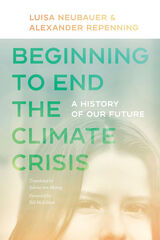
“Act as though your house is on fire. Because it is.” Following Greta Thunberg, millions of young climate activists have been taking to the streets around the globe as part of the Fridays For Future movement. They demand that we “unite behind the science,” as, for too long, climate scientists have been ringing the alarm bells about rising temperatures, tipping points, and the devastating consequences of extreme weather—but politicians do nothing.
So how do you begin to end the climate crisis? Luisa Neubauer and Alexander Repenning begin by telling stories. Neubauer cofounded the youth climate activist group in Germany and has become its most prominent voice. In this book she and Repenning weave in personal accounts of their evolution as climate activists with a thorough analysis of how climate change impacts their generation, and what every one of us can and must do about it. The young and old in the United States and around the world can learn valuable lessons from their European counterparts.
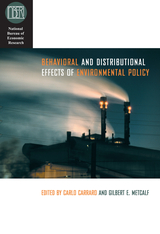

What do we know about the possible poisons that industrial technologies leave in our air and water? How reliable is the science that federal regulators and legislators use to protect the public from dangerous products? As this disturbing book shows, ideological or economic attacks on research are part of an extensive pattern of abuse.
Thomas O. McGarity and Wendy E. Wagner reveal the range of sophisticated legal and financial tactics political and corporate advocates use to discredit or suppress research on potential human health hazards. Scientists can find their research blocked, or find themselves threatened with financial ruin. Corporations, plaintiff attorneys, think tanks, even government agencies have been caught suppressing or distorting research on the safety of chemical products.
With alarming stories drawn from the public record, McGarity and Wagner describe how advocates attempt to bend science or “spin” findings. They reveal an immense range of tools available to shrewd partisans determined to manipulate research.
Bending Science exposes an astonishing pattern of corruption and makes a compelling case for reforms to safeguard both the integrity of science and the public health.

"Betting the Earth explores the uneasy parallels between our contemporary environmental challenges and our national fascination with gambling. How much should we bet on preserving biodiversity? Should we bet more on responding to climate change? where should we place each bet: on federal or state laws, on acquiring public or private preserves, on preventing environmental harms or saving places of special environmental significance? Like it or not, we must make such choices every day, and Betting the Earth helps us to understand how we do so."
Professor John Copeland Nagle, John N. Matthews Chair in Law, University of Notre Dame Law School

California’s experience provides a rare opportunity to learn from a collaborative public process involving private interests and science-intensive decisions. Determined to do just that, Steven Yaffee, a renowned expert on negotiation and collaborative decision making, spent hundreds of hours researching the MLPA process in an effort to understand how California succeeded where other efforts have failed. The result is Beyond Polarization, a highly readable insider’s perspective on complicated decision-making processes and the strategic choices necessary for success. The book follows the initiative process region by region, each with its unique stakeholders and geographic concerns. These lessons can be applied to similar collaborative processes across the country and world.
Beyond Polarization presents an optimistic message about the public policy process in a time of civic division. It offers reassurance that, by using proven decision-making processes, policymakers, scientists, and local citizens can successfully collaborate to manage and protect natural resources we all have a stake in.
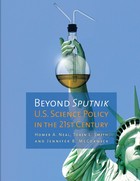
Science and technology are responsible for almost every advance in our modern quality of life. Yet science isn't just about laboratories, telescopes and particle accelerators. Public policy exerts a huge impact on how the scientific community conducts its work. Beyond Sputnik is a comprehensive survey of the field for use as an introductory textbook in courses and a reference guide for legislators, scientists, journalists, and advocates seeking to understand the science policy-making process. Detailed case studies---on topics from cloning and stem cell research to homeland security and science education---offer readers the opportunity to study real instances of policymaking at work. Authors and experts Homer A. Neal, Tobin L. Smith, and Jennifer B. McCormick propose practical ways to implement sound public policy in science and technology and highlight how these policies will guide the results of scientific discovery for years to come.
Homer A. Neal is the Samuel A. Goudsmit Distinguished University Professor of Physics, Interim President Emeritus, and Vice President for Research Emeritus at the University of Michigan, and is a former member of the U.S. National Science Board.
Tobin L. Smith is Associate Vice President for Federal Relations at the Association of American Universities. He was formerly Assistant Director of the University of Michigan and MIT Washington, DC, offices.
Jennifer B. McCormick is an Assistant Professor of Biomedical Ethics in the Division of General Internal Medicine at the Mayo College of Medicine in Rochester, Minnesota, and is the Associate Director of the Research Ethics Resource, part of the Mayo Clinic's NIH Clinical Translational Science Award research programs.
GO BEYOND SPUTNIK ONLINE--Visit www.science-policy.net for the latest news, teaching resources, learning guides, and internship opportunities in the 21st-Century field of science policy.
"Beyond Sputnik is a readable, concise, yet remarkably comprehensive introduction to contemporary science policy. It is devoid of 'wonkishness' yet serves the needs of policymakers and students alike. Because science and technology policy is of central importance in the twenty-first century this accessible volume is a godsend."
---Charles M. Vest, President of the National Academy of Engineering and Vice Chair of the National Research Council of the National Academies of Sciences and Engineering
"This highly researched book is a treasure trove for anyone concerned with science policy relating to such challenges as providing energy, preserving the environment, assuring healthcare, creating jobs, and more."
---Norman Augustine, retired Chairman and CEO of Lockheed Martin Corporation and recipient of the 2008 Vannevar Bush Award from the National Science Board
"Science policy is a subject of growing importance in the United States, yet there has long been a vacuum among textbooks in the field. Beyond Sputnik fills it splendidly and will be greeted with enthusiasm by students and faculty alike. Even those who have practiced the art for years will learn from it."
---Albert Teich, Director of Science and Policy Programs at the American Association for the Advancement of Science
"Homer A. Neal, Tobin L. Smith, and Jennifer B. McCormick have written a landmark work calling for a national effort to restore our nation's power in the fields of science, energy, and education, as we did in the remarkable year following Sputnik. The next preident should read Beyond Sputnik and accept this call to action as did President Eisenhower."
---Ambassador David M. Abshire, President of the Center for the Study of the Presidency, Cofounder and Vice Chairman of the Center for Strategic and International Studies, and President of the Richard Lounsbery Foundation
"At last we have a text that tells the story from where A. Hunter Dupree left off; an excellent core text for courses in science and technology policy, DC policymakers, and anyone who needs to get up to speed in the field . . . The book that we have all been waiting for."
---Christopher T. Hill, Professor of Public Policy and Technology, George Mason University

The authors employ a new research methodology—surveying party militants—that is better adapted to the study of micropolitics than are expert interviews. Herbert Kitschelt and Staf Hallemans show that European Green party activists express an egalitarian and libertarian vision of a desirable social order that builds on, but radically transforms, ideas of the traditional socialist European left. The authors then examine the debates and disagreements among militants on political objectives and the consequences of conflicting views for party organization and strategy. Their findings illuminate the unique dynamics of left-libertarian politics in a number of Western European countries with obvious relevance to current developments in Eastern Europe.


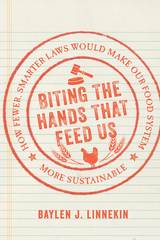
Food waste, hunger, inhumane livestock conditions, disappearing fish stocks—these are exactly the kind of issues we expect food regulations to combat. Yet, today in the United States, laws exist at all levels of government that actually make these problems worse. Baylen Linnekin argues that, too often, government rules handcuff America’s most sustainable farmers, producers, sellers, and consumers, while rewarding those whose practices are anything but sustainable.
Biting the Hands that Feed Us introduces readers to the perverse consequences of many food rules. Some of these rules constrain the sale of “ugly” fruits and vegetables, relegating bushels of tasty but misshapen carrots and strawberries to food waste. Other rules have threatened to treat manure—the lifeblood of organic fertilization—as a toxin. Still other rules prevent sharing food with the homeless and others in need. There are even rules that prohibit people from growing fruits and vegetables in their own yards.
Linnekin also explores what makes for a good food law—often, he explains, these emphasize good outcomes rather than rigid processes. But he urges readers to be wary of efforts to regulate our way to a greener food system, calling instead for empowerment of those working to feed us—and themselves—sustainably.
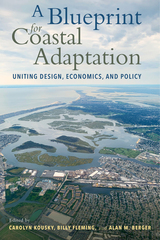
In this book, coastal adaptation experts discuss the interrelated challenges facing communities experiencing sea level rise and increasing storm impacts. These issues extend far beyond land use planning into housing policy, financing for public infrastructure, insurance, fostering healthier coastal ecosystems, and more. Deftly addressing far-reaching problems from cleaning up contaminated, abandoned sites, to changes in drinking water composition, chapters give a clear-eyed view of how we might yet chart a course for thriving coastal communities. They offer a range of climate adaptation policies that could protect coastal communities against increasing risk, while preserving the economic value of these locations, their natural environments, and their community and cultural values. Lessons are drawn from coastal communities around the United States to present equitable solutions. The book provides tools for evaluating necessary tradeoffs to think more comprehensively about the future of our coastal communities.
Coastal adaptation will not be easy, but planning for it is critical to the survival of many communities. A Blueprint for Coastal Adaptation will inspire innovative and cross-disciplinary thinking about coastal policy at the state and local level while providing actionable, realistic policy and planning options for adaptation professionals and policymakers.

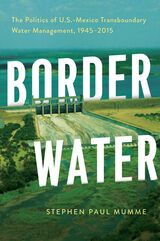
The international boundary between the United States and Mexico spans more than 1,900 miles. Along much of this international border, water is what separates one country from the other. Border Water provides a historical account of the development of governance related to transboundary and border water resources between the United States and Mexico in the last seventy years.
This work examines the phases and pivot points in the development of U.S.-Mexico border water resources and reviews the theoretical approaches and explanation that impart a better understanding of these events. Author Stephen Paul Mumme, a leading expert in water policy and border studies, describes three important periods in the chronology of transboundary water management. First, Mumme examines the 1944 Water Treaty, the establishment of the International Boundary and Water Commission (IBWC) in 1945, and early transborder politics between the two governments. Next, he describes the early 1970s and the rise of environmentalism. In this period, pollution and salinization of the Colorado River Delta come into focus. Mumme shows how new actors, now including environmentalists and municipalities, broadened and strengthened the treaty’s applications in transboundary water management. The third period of transborder interaction described covers the opening and restricting of borders due to NAFTA and then 9/11.
Border Water places transboundary water management in the frame of the larger binational relationship, offering a comprehensive history of transnational water management between the United States and Mexico. As we move into the next century of transnational water management, this important work offers critical insights into lessons learned and charts a path for the future.

Bottled and Sold shows how water went from being a free natural resource to one of the most successful commercial products of the last one hundred years—and why we are poorer for it. It’s a big story and water is big business. Every second of every day in the United States, a thousand people buy a plastic bottle of water, and every second of every day a thousand more throw one of those bottles away. That adds up to more than thirty billion bottles a year and tens of billions of dollars of sales.
Are there legitimate reasons to buy all those bottles? With a scientist’s eye and a natural storyteller’s wit, Gleick investigates whether industry claims about the relative safety, convenience, and taste of bottled versus tap hold water. And he exposes the true reasons we’ve turned to the bottle, from fearmongering by business interests and our own vanity to the breakdown of public systems and global inequities.
"Designer" H2O may be laughable, but the debate over commodifying water is deadly serious. It comes down to society’s choices about human rights, the role of government and free markets, the importance of being "green," and fundamental values. Gleick gets to the heart of the bottled water craze, exploring what it means for us to bottle and sell our most basic necessity.

Sarah B. Pralle takes an in-depth look at why some environmental conflicts expand to attract a lot of attention and participation, while others generate little interest or action. Branching Out, Digging In examines the expansion and containment of political conflict around forest policies in the United States and Canada.
Late in 1993 citizens from around the world mobilized on behalf of saving old-growth forests in Clayoquot Sound. Yet, at the same time only a very few took note of an even larger reserve of public land at risk in northern California. Both cases, the Clayoquot Sound controversy in British Columbia and the Quincy Library Group case in the Sierra Nevada mountains of northern California, centered around conflicts between environmentalists seeking to preserve old-growth forests and timber companies fighting to preserve their logging privileges. Both marked important episodes in the history of forest politics in their respective countries but with dramatically different results. The Clayoquot Sound controversy spawned the largest civil disobedience in Canadian history; international demonstrations in Japan, England, Germany, Austria, and the United States; and the most significant changes in British Columbia's forest policy in decades. On the other hand, the California case, with four times as many acres at stake, became the poster child for the "collaborative conservation" approach, using stakeholder collaboration and negotiation to achieve a compromise that ultimately broke down and ended up in the courts.
Pralle analyzes how the various political actors—local and national environmental organizations, local residents, timber companies, and different levels of government—defined the issues in both words and images, created and reconfigured alliances, and drew in different governmental institutions to attempt to achieve their goals. She develops a dynamic new model of conflict management by advocacy groups that puts a premium on nimble timing, flexibility, targeting, and tactics to gain the advantage and shows that how political actors go about exploiting these opportunities and overcoming constraints is a critical part of the policy process.

In Bridging a Great Divide, award-winning environmental journalist Kathie Durbin draws on interviews, correspondence, and extensive research to tell the story of the major shifts in the Gorge since the Act’s passage. Sweeping change has altered the Gorge’s landscape: upscale tourism and outdoor recreation, gentrification, the end of logging in national forests, the closing of aluminum plants, wind farms, and a population explosion in the metropolitan area to its west. Yet, to the casual observer, the Gorge looks much the same as it did twenty-five years ago.
How can we measure the success of the Columbia River Gorge National Scenic Area Act? In this insightful and revealing history, Durbin suggests that the answer depends on who you are: a small business owner, an environmental watchdog group, a chamber of commerce. The story of the Columbia River Gorge National Scenic Area is the story of the Pacific Northwest in microcosm, as the region shifts from a natural-resource-based economy to one based on recreation, technology, and quality of life.
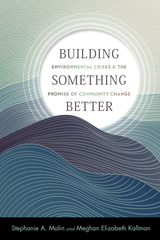
Sociologists Stephanie A. Malin and Meghan Elizbeth Kallman offer a clear, accessible volume that demonstrates the ways that communities adapt in the face of crises and explains that sociology can help us understand how and why they do this challenging work. Tackling neoliberalism head-on, these communities are making big changes by crafting distributive and regenerative systems that depart from capitalist approaches. The vivid case studies presented range from activist water protectors to hemp farmers to renewable energy cooperatives led by Indigenous peoples and nations. Alongside these studies, Malin and Kallman present incisive critiques of colonialism, extractive capitalism, and neoliberalism, while demonstrating how sociology’s own disciplinary traditions have been complicit with those ideologies—and must expand beyond them.
Showing that it is possible to challenge social inequality and environmental degradation by refusing to continue business-as-usual, Building Something Better offers both a call to action and a dose of hope in a time of crises.

The literature of bureaucratic theory is rife with contradictions and mysteries. Bureaucrats, Politics, and the Environment attempts to clarify some of these problems.
The authors surveyed the workers at two agencies: enforcement personnel from the U.S. Environmental Protection Agency, and employees of the New Mexico Environment Department. By examining what they think about politics, the environment, their budgets, and the other institutions and agencies with which they interact, this work puts a face on the bureaucracy and provides an explanation for its actions.
READERS
Browse our collection.
PUBLISHERS
See BiblioVault's publisher services.
STUDENT SERVICES
Files for college accessibility offices.
UChicago Accessibility Resources
home | accessibility | search | about | contact us
BiblioVault ® 2001 - 2024
The University of Chicago Press









